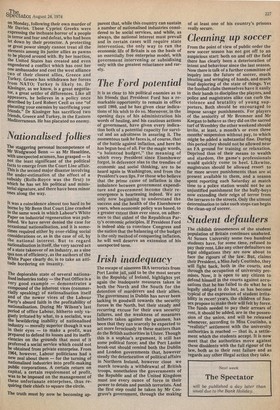Nationalised follies
The staggering personal incompetence of Mr Wedgwood Benn — as Mr Hese'tine, With unexpected acumen, has grasped — is not the least significant of the political facts to emerge from the Court Line affair. This is the second major disaster involving the under-estimation of the effect of a subsidy (Rolls-Royce was the first) to Which he has set his political and ministerial signature, and there have been minor Ones along the way.
It was a coincidence almost too hard to be !)orne by Mr Benn that Court Line crashed in the same week in which Labour's White Paper on industrial regeneration was published. We have never denied the case for occ,asional nationalisation, and it is sometimes required either by over-riding social considerations or, as in the case of oil, by the national interest. But to regard nationalisation in itself, the very sacred act of a state takeover of an industry, as a sine qua non of efficiency, as the authors of the White Paper clearly do, is to take an attitude bordering on insanity.
The deplorable state of several nationalised industries today — the Post Office is a very good example — demonstrates a compound of the inherent vices (commercially speaking) of nationalisation itself and of the newer vices of the Labour Party's absurd faith in the profitability of nationalisation. During Mr Wilson's last period of office Labour, hitherto only vaguely irritated by what, to a socialist, was the bewildering inability of nationalised industry — morally superior though it was in their eyes — to make a profit, was Prepared to defend its losses and its inefficiencies on the grounds that most of it proferred a social service which could not be obtained from private enterprise. From 1964, however, Labour politicians had a new zeal about them — for the turning of nationalised industries into profit-making Public corporations. A certain return on capital, a certain requirement of profit, was to be imposed on the management of these unfortunate enterprises, thus requiring their chiefs to square the circle.
The truth must by now be becoming ap parent that, while this country can sustain a number of nationalised industries considered to be social services, and while, as always, the national interest must prevail and in certain cases will require state intervention, the only way to run the economic life of Britain is on the basis of an essentially free enterprise model, with government intervening or subsidising only with the greatest reluctance and rarely.


































 Previous page
Previous page